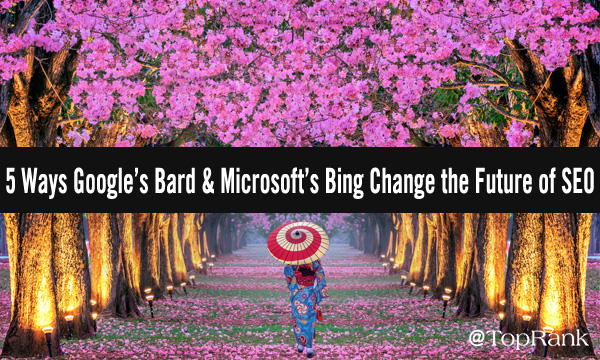

How is ChatGPT artificial intelligence (AI) chatbot technology changing search engine optimization (SEO), and how will the major shifts being implemented by Google, Microsoft and others alter the business marketing landscape of the future? During my 39 years working in online communications I’ve seen immense changes in search engine technology and how businesses optimize their ever-growing collections of digital content, and consider AI’s impact on the search industry to be one of the biggest shifts yet. ChatGPT — short for generative pre-trained transformer — was rolled out as a prototype in November 2022 by the OpenAI AI research organization, and takes the form of a website interface where users type in questions and receive written responses. It has been backed financially in part by Microsoft, which in January 2023 leaned into the partnership in the form of a multi-billion dollar investment over multiple years, as we covered in
our weekly Elevate B2B Marketing news. Google recently announced Bard, its new experimental conversational AI service powered by its Language Model for Dialogue Applications (LaMDA) project, along with plans to use it to improve Google’s search engine, and today Microsoft has also announced its own initiative to use AI in new iterations of its Bing search engine. The way that the world engages with information is changing, and the generative AI technology Google and Microsoft are moving forward with represent a previously missing link between the roots of traditional search engines and next-level universal indexing and information presentation. Let’s take a look at five key ways that generative AI is changing the future of business search and SEO — from Google’s new Bard to Microsoft’s latest AI-based Bing efforts, and have a glimpse at where Apple, Meta, and other leading technology firms are heading at the intersection of search and AI. [bctt tweet="“The way that the world engages with information is changing, and the generative AI technology Google and Microsoft are moving forward with represent a previously missing link.” — Lane R. Ellis @lanerellis" username="toprank"]
1 — Google’s Bard & Generative AI-Infused Search Future
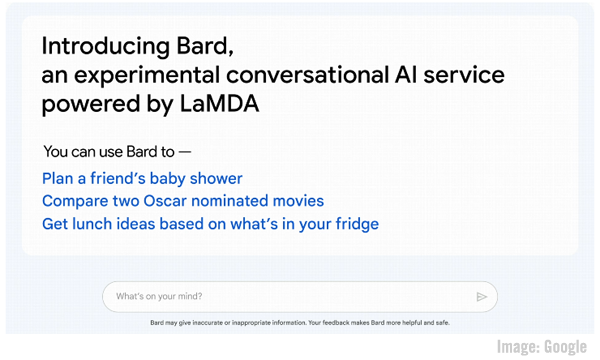
With the launch of its Bard AI service, Google has signaled a search future in which it looks to temper the benefits of AI with an understanding of those areas where the technology may pose challenges. “Soon, you’ll see AI-powered features in search that distill complex information and multiple perspectives into easy-to-digest formats, so you can quickly understand the big picture and learn more from the web,”
Sundar Pichai, chief executive at Google explained recently as the search giant announced plans to expand its use of AI in search, in “
An Important Next Step on Our AI Journey.” When I first heard the name that Google had chosen for its AI chatbot technology my heart sank a bit, as it somehow felt like a bit of a digital slap in the face to Shakespeare, even though I suspect the teams at Google chose to use Bard with respectful intentions. Google has highlighted the power of Bard to tailor search results to an intended audience, and how more generally AI will benefit the company’s line of products. “Bard seeks to combine the breadth of the world’s knowledge with the power, intelligence and creativity of our large language models,” Pichai noted. “It draws on information from the web to provide fresh, high-quality responses. Bard can be an outlet for creativity, and a launchpad for curiosity, helping you to explain new discoveries from NASA’s James Webb Space Telescope to a 9-year-old, or learn more about the best strikers in football right now, and then get drills to build your skills,” Pichai added. The Google announcement piqued the interest of search industry professionals from journalists to B2B marketers. “I am super excited to see how this evolves at Google, Bing and others,” longtime search industry journalist
Barry Schwartz recently noted in a look at the initial rollout news of Google’s Bard, in Search Engine Roundtable’s “
Google Search Launches Bard, It's ChatGPT Feature, To Trusted Testers (SEOs Concerned).” “Integration of language models like ChatGPT and Bard to online content discovery and customer journeys will be having profound effects on the global e-commerce and B2B marketing landscapes,”
Anoop Madhusudanan, global vice president of digital marketing and engineering at West Pharma recently
noted. [bctt tweet="“Integration of language models like ChatGPT and Bard to online content discovery and customer journeys will be having profound effects on the global e-commerce and B2B marketing landscapes.” — Anoop Madhusudanan of @WestPharma" username="toprank"]
2 — Microsoft’s Multi-Billion-Dollar OpenAI & Prometheus-Powered Bing Shifts
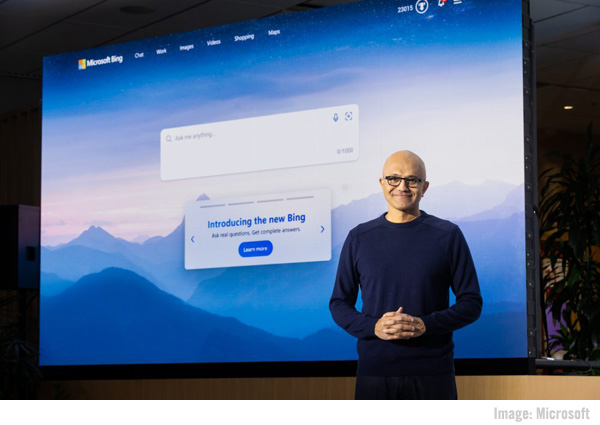
Just a day after Google’s Bard announcement, Microsoft chief executive
Satya Nadella, corporate vice president and consumer chief marketing officer
Yusuf Mehdi, and OpenAI chief executive
Sam Altman unveiled both a forthcoming new chatbot and search hybrid Bing and corresponding Edge web browser. The two will feature a more powerful language model than ChatGPT presently uses, built specifically with search as a focus, using
a new Prometheus large-language model, Mehdi also noted in Microsoft's
official announcement of the new products. Microsoft’s new AI-infused Bing has rolled out in a limited preview for desktop users, with mobile support expected soon. New Bing features include the ability to fully interact by voice, while the new Edge browser includes a chatbot sidebar. If it’s seemed that ChatGPT has become nearly ubiquitous in the news cycles of early 2023, it’s for good reason, as
the chatbot service recently became the fastest-growing program in history, according to UBS estimates recently noted by
Krystal Hu of Reuters in “
ChatGPT sets record for fastest-growing user base - analyst note,” with some 57 million unique visitors having been tallied in December 2022 alone, and
now topping the 100 million monthly active users mark. Within this framework, Microsoft has sought to grow a closer partnership with OpenAI, and now to expand how the technology is used in its Bing search engine and Edge browser. “Microsoft also brings a lot of sensibilities about these things as a partner as well,”
Bill Gates, co-founder of Microsoft observed in an interview with Forbes’
Alex Konrad, “
Exclusive: Bill Gates On Advising OpenAI, Microsoft And Why AI Is ‘The Hottest Topic Of 2023’.” “And look, AI is going to be debated. It'll be the hottest topic of 2023, and that's appropriate,” Gates added. Nadella too shared a similarly broad outlook on how AI will affect multiple Microsoft products. "AI will fundamentally change every software category, starting with the largest category of all – search," Nadella explained. "Today, we’re launching Bing and Edge powered by AI copilot and chat, to help people get more from search and the web," he added in Microsoft's announcement.
Dave Hedengren, partner data science manager, Core Search and AI at Microsoft, expressed enthusiasm for the Bing announcement. "I've never worked so long and hard on a product launch but I can honestly say that I was excited by every minute of it" Hedengren
noted, adding "I firmly believe this is the next leap in learning and problem solving." The particulars of how the new Bing will affect advertising placements has yet to be seen, with
Nicole Farley setting out initial takes for Search Engine Land in "
Will the new Bing create more opportunities for advertisers? Maybe," while both the New York Times with its "
Microsoft Throws a Coming-Out Party for A.I." and the Wall Street Journal with its "
Microsoft Adds ChatGPT AI Technology to Bing Search Engine" examined the broader scope of Microsoft's newest incarnation of Bing. Microsoft’s new AI-infused Bing has its work cut out for itself, with the search engine accounting for
less than nine percent of the global search market as of December 2022 — ahead of Yahoo’s 2.55 percent yet far from Google’s dominant share of more than 84 percent. Mehdi looks to begin changing this with a new generation of Microsoft search and other AI tools that act as somewhat of a digital co-pilot. "There are 10 billion search queries a day, but we estimate half of them go unanswered," Mehdi noted, adding "That’s because people are using search to do things it wasn’t originally designed to do. It’s great for finding a website, but for more complex questions or tasks too often it falls short." [bctt tweet="“AI will fundamentally change every software category, starting with the largest category of all – search.” — Satya Nadella @SatyaNadella" username="toprank"]
3 — Which AI & Search Basket Will Apple & Others Land In?
Apple to date has used Google as its default search engine for its devices and operating systems — a search placement deal dating back over a decade that has by some estimates grown to see Google paying Apple as much as $15 billion annually to keep the lucrative search agreement in place. Apple’s search, along with its Siri voice-based suggestion technology, has been the subject of ongoing speculation about eventually moving away from Google and to its own search technology, although some estimates see such a move unlikely to happen for several years, as
David Price explored in Macworld’s “
Apple is reportedly developing its own search engine to take on Google.” "We see enormous potential in this space to affect virtually everything we do,” Apple chief executive
Tim Cook noted of AI in a recent earnings call, adding that “It will affect every product and every service that we have," as
Samantha Delouya recently covered in Business Insiders’s “
Apple CEO Tim Cook says AI will eventually 'affect every product and service we have'.” Along with Apple, Facebook and Instagram parent company Meta doesn’t yet have an AI chatbot path that’s been as clearly laid out as Google or Microsoft, however it certainly has ambitions of its own and has been working for years on how best to utilize the technology, as
Cade Metz and
Mike Isaac explored in The New York Times’ “
Meta, Long an A.I. Leader, Tries Not to Be Left Out of the Boom.” Apple, Meta and other large technology companies have much to lose should they not be able to expand their AI offerings swiftly, as recent estimates suggest that
by 2027 some 90 percent of digital advertising campaigns will be influenced by AI, as
Seb Joseph and
Marty Swant covered for Digiday in “
Google, Meta and large media agencies Havas, Horizon are increasingly focused on, and investing in, AI-powered advertising.” Faced with this alongside the recent announcements of Google’s Bard and Microsoft’s new chatbot and search hybrid Bing, Apple, Meta, and other major technology firms will face increasing pressure to provide generative AI features. [bctt tweet="“We see enormous potential in this space to affect virtually everything we do. It (AI) will affect every product and every service that we have ” — Tim Cook @Tim_Cook" username="toprank"]
4 — The Missing Link of Engaging With Information
AI may prove to be search’s missing link when it comes to engaging with information. The skyrocketing use of AI chatbots may at times seem to be a radical departure from the basic tenets of search, however when looking at the big picture of how we engage with information, ChatGPT, Bard, the new Bing and the like may simply be a natural part of the ongoing transformation of search. In in the B2B sector — with its longer buying cycles and a greater number of touch-points than in the B2C world, a better search experience thanks to generative AI could be particularly welcome, as B2B buyers seek to find information about generally more complex products and services — just the type of area where Google's Bard and Microsoft's new Bing could become a differentiator. The already fine line between indexing the world’s digital information and blatantly scraping, re-mixing and publication without source credit, citation, or legal permission is likely to become an even more contentious issue however, as AI enters the mainstream of search. Sometimes gathering data for AI is done under the guise of learning or training, and when it isn’t done with legal permissions having been gathered, cases have arisen such as those brought recently by Getty Images, as
Ashley Belanger explored in Ars Technica’s “
Getty sues Stability AI for copying 12M photos and imitating famous watermark.” AI chatbot technology raises many legal questions relating to copyright that are likely to outpace development and implementation — as has often been the case with new technologies — yet B2B brands stand to gain an advantage by staying abreast of legal news related to AI and search. I explored some of these issues and more in “
The Prompt Whisperer: ChatGPT’s Rising Reach In B2B Marketing & The AI Revolution,” and although further obstacles will undoubtedly arise, there’s no question that
generative AI will forever change the face of search and optimization. [bctt tweet="“AI technology raises legal questions relating to copyright that are likely to outpace development and implementation, yet B2B brands stand to gain an advantage by staying abreast of legal news related to AI and search.” — @lanerellis" username="toprank"]
5 — Generative AI & Skyrocketing Searcher Expectations
All of the swift changes that AI is bringing to the search experience will forever alter our expectations when we use a search engine, and with this may also come a wider scope of SEO opportunities — and new challenges — that B2B brands and optimizers will need to adapt to. Searchers in Generation Alpha — Gen Z’s younger demographic cousins — will come of age in a world where AI has always existed, and where its role in search doesn’t raise an eyebrow. These young professionals will account for the next wave of B2B buyers and marketers alike, and
brands that don’t adjust to the changes that AI chatbot technology is bringing to search and SEO face uncertain futures. Just how SEO professionals will need to adapt to the industry changes being brought about by the generative AI initiatives being developed by Google, Microsoft and others can’t be pinned down with any concrete certainty just yet, however there are fundamental best-practices that are almost certain to carry over into the AI era of search. Facing increasing automation from ChatGPT and other AI-infused tools, B2B marketers are also taking a closer look at our truly human touch-points to differentiate in the unique year that 2023 is shaping up to be, as we examined recently in "
What Recent Data Shows About The Rising Importance of Human Touch-Points in B2B Marketing." Successful B2B optimizers will be those who can competently augment today’s SEO fundamentals with tomorrow’s generative chatbot search innovations. [bctt tweet="“Successful B2B optimizers will be those who can competently augment today’s SEO fundamentals with tomorrow’s generative chatbot search innovations.” — Lane R. Ellis @lanerellis" username="toprank"]
Generative AI Expands the Lense of SEO Possibilities for B2B Brands
via GIPHY Google’s Bard and Microsoft’s Prometheus-Based Bing are poised to usher in new and potentially better search engine experiences, and with them new SEO challenges and opportunities for B2B marketers and brands. We hope this look at some of the latest ways that generative AI is changing the future of search will help with your own efforts during what is set to be a watermark year for SEO. More than ever before, creating award-winning B2B marketing that elevates, gives voice to talent, and humanizes with authenticity takes considerable time and effort, which is why more brands are choosing to work with a top digital marketing agency such as TopRank Marketing.
Reach out to learn how we can help, as we’ve done for over 20 years for businesses ranging from LinkedIn, Dell and 3M to Adobe, Oracle, monday.com and many others.
The post B2B Search Marketing: 5 Key Ways Generative AI is Changing the Future of SEO from Google’s Bard to Microsoft’s Prometheus-Based Bing appeared first on B2B Marketing Blog - TopRank®.
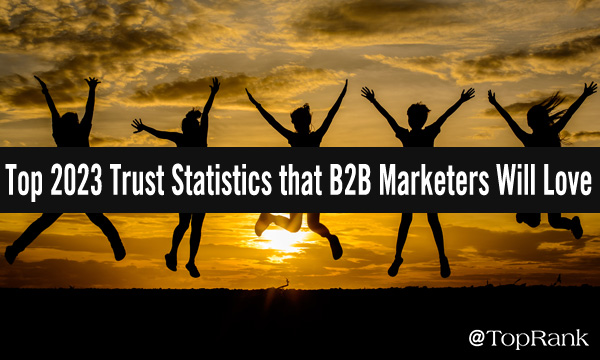
 It’s almost Valentine’s Day, that commodified and commercialized celebration of the most bountiful and free resource we have. But cynicism aside, love in all its forms is a beautiful thing worth celebrating. And one absolutely essential part of love is trust. It’s asking someone to put their trust in you and having faith you will get the same in return. That’s something no amount of flowers and chocolate can buy. As a marketer, you want customers to fall in love with your brand. But that type of love requires trust, too. And on that point, we’ve got good news and bad news. Edelman just published their 2023 Trust Barometer. It’s always an eye-opening read, and this year has some fascinating stats that marketers need to know. Here are some key takeaways from Edelman, along with statistics from a few other trustworthy sources.
It’s almost Valentine’s Day, that commodified and commercialized celebration of the most bountiful and free resource we have. But cynicism aside, love in all its forms is a beautiful thing worth celebrating. And one absolutely essential part of love is trust. It’s asking someone to put their trust in you and having faith you will get the same in return. That’s something no amount of flowers and chocolate can buy. As a marketer, you want customers to fall in love with your brand. But that type of love requires trust, too. And on that point, we’ve got good news and bad news. Edelman just published their 2023 Trust Barometer. It’s always an eye-opening read, and this year has some fascinating stats that marketers need to know. Here are some key takeaways from Edelman, along with statistics from a few other trustworthy sources.
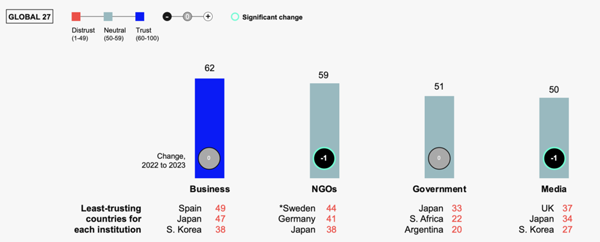 [bctt tweet="“As trust in public institutions wanes, businesses become one of the few trusted entities left. That’s an opportunity for marketers, but a responsibility as well. We have to respect and reward that trust, or it won’t last.” @NiteWrites" username="toprank"]
[bctt tweet="“As trust in public institutions wanes, businesses become one of the few trusted entities left. That’s an opportunity for marketers, but a responsibility as well. We have to respect and reward that trust, or it won’t last.” @NiteWrites" username="toprank"]
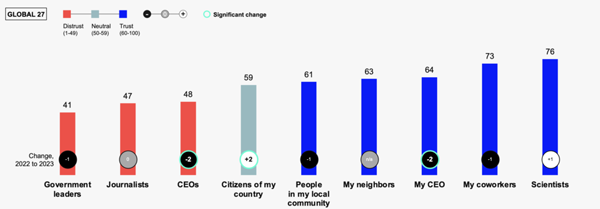 You can see that the most trusted include “people in my community,” “my neighbors,” “my CEO” and “co-workers.” All of these are built on personal or business relationships — which means marketers should be working on building relationships, too. In our B2B Influencer Marketing Report, 70% of our respondents said their customers rely on advice from experts or insiders. Find the influencers your customers already know and trust on a personal level, and you can help build credibility for your brand. [bctt tweet="“Find the influencers your customers already know and trust on a personal level, and you can help build credibility for your brand.” — Joshua Nite @NiteWrites" username="toprank"]
You can see that the most trusted include “people in my community,” “my neighbors,” “my CEO” and “co-workers.” All of these are built on personal or business relationships — which means marketers should be working on building relationships, too. In our B2B Influencer Marketing Report, 70% of our respondents said their customers rely on advice from experts or insiders. Find the influencers your customers already know and trust on a personal level, and you can help build credibility for your brand. [bctt tweet="“Find the influencers your customers already know and trust on a personal level, and you can help build credibility for your brand.” — Joshua Nite @NiteWrites" username="toprank"]
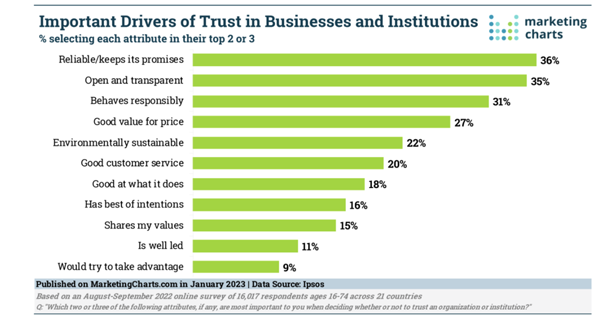 These three are especially critical in the age of mass information and citizen journalists. If a company posts about Black Lives Matter, someone (or multiple someones) can point out they have no diversity in their C-suite. A company that pays lip service to sustainability while dumping plastics in the ocean will be found out and boycotted. The same is true for transparency: If your company claims to be open and honest about how it deals with customer data, that claim better be rock-solid.
These three are especially critical in the age of mass information and citizen journalists. If a company posts about Black Lives Matter, someone (or multiple someones) can point out they have no diversity in their C-suite. A company that pays lip service to sustainability while dumping plastics in the ocean will be found out and boycotted. The same is true for transparency: If your company claims to be open and honest about how it deals with customer data, that claim better be rock-solid.
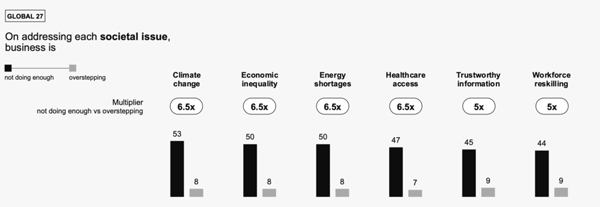 It’s worth noting that in particularly polarized countries (like the U.S.), the majority of people say that brands can’t avoid being political when addressing contentious social issues. However, brands can combat being viewed as political by being a consistently reliable source of information, basing their actions on science, and acting on the same values over time. If your business has a clear purpose, consistently works to make the world a better place, and builds trust and credibility over time, you can avoid the effects of political polarization. [bctt tweet="“Brands can combat being viewed as political by being a consistently reliable source of information, basing their actions on science, and acting on the same values over time.” — Joshua Nite @NiteWrites" username="toprank"]
It’s worth noting that in particularly polarized countries (like the U.S.), the majority of people say that brands can’t avoid being political when addressing contentious social issues. However, brands can combat being viewed as political by being a consistently reliable source of information, basing their actions on science, and acting on the same values over time. If your business has a clear purpose, consistently works to make the world a better place, and builds trust and credibility over time, you can avoid the effects of political polarization. [bctt tweet="“Brands can combat being viewed as political by being a consistently reliable source of information, basing their actions on science, and acting on the same values over time.” — Joshua Nite @NiteWrites" username="toprank"]
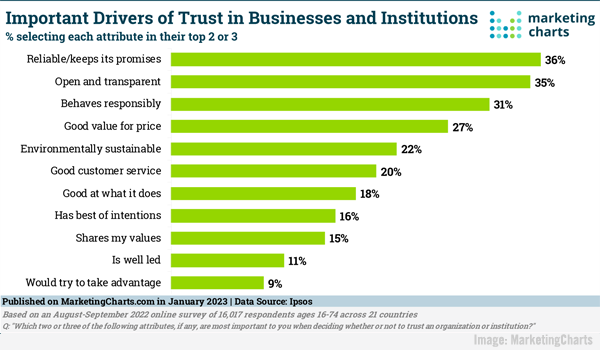
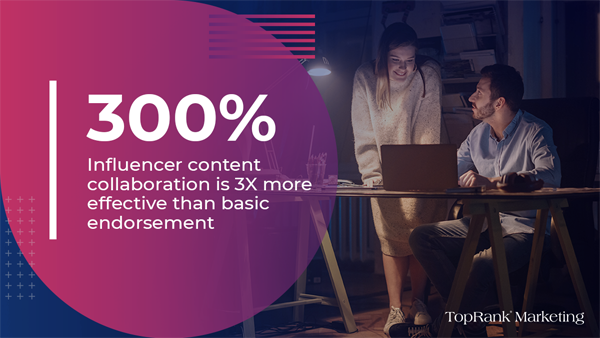
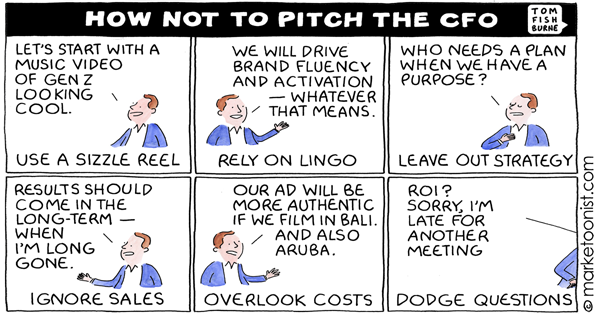 A lighthearted look at “Marketing to the CFO” by Marketoonist Tom Fishburne —
A lighthearted look at “Marketing to the CFO” by Marketoonist Tom Fishburne — 
 With the launch of its Bard AI service, Google has signaled a search future in which it looks to temper the benefits of AI with an understanding of those areas where the technology may pose challenges. “Soon, you’ll see AI-powered features in search that distill complex information and multiple perspectives into easy-to-digest formats, so you can quickly understand the big picture and learn more from the web,”
With the launch of its Bard AI service, Google has signaled a search future in which it looks to temper the benefits of AI with an understanding of those areas where the technology may pose challenges. “Soon, you’ll see AI-powered features in search that distill complex information and multiple perspectives into easy-to-digest formats, so you can quickly understand the big picture and learn more from the web,”  Just a day after Google’s Bard announcement, Microsoft chief executive
Just a day after Google’s Bard announcement, Microsoft chief executive 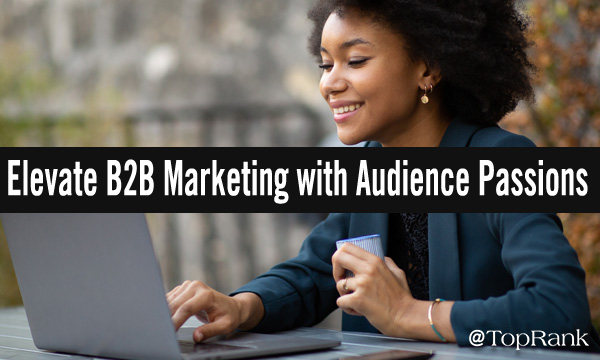
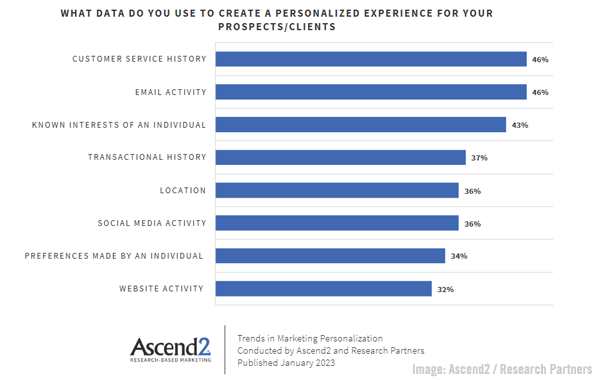
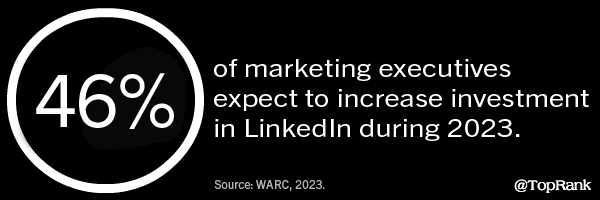 Instagram's co-founders are mounting a comeback The co-founders of Instagram have been putting together plans for a forthcoming new social media platform, as it has begun accepting early applications to beta test its new Artifact platform, which seeks to explore the merging of AI, articles, and facts, and Platformer recently took a look.
Instagram's co-founders are mounting a comeback The co-founders of Instagram have been putting together plans for a forthcoming new social media platform, as it has begun accepting early applications to beta test its new Artifact platform, which seeks to explore the merging of AI, articles, and facts, and Platformer recently took a look. 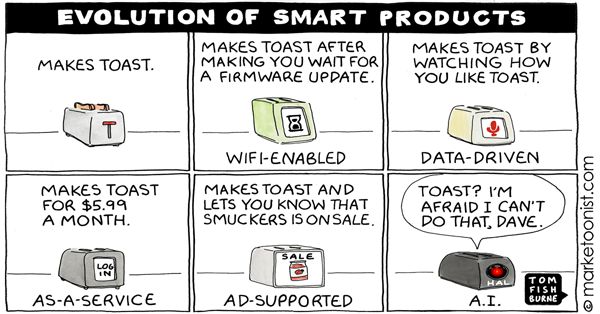 A lighthearted look at the “Evolution of Smart Products” by Marketoonist Tom Fishburne —
A lighthearted look at the “Evolution of Smart Products” by Marketoonist Tom Fishburne — 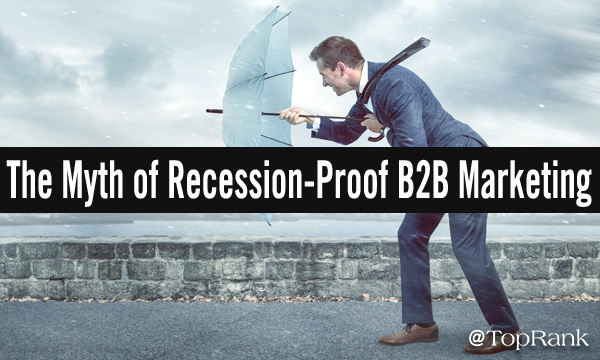
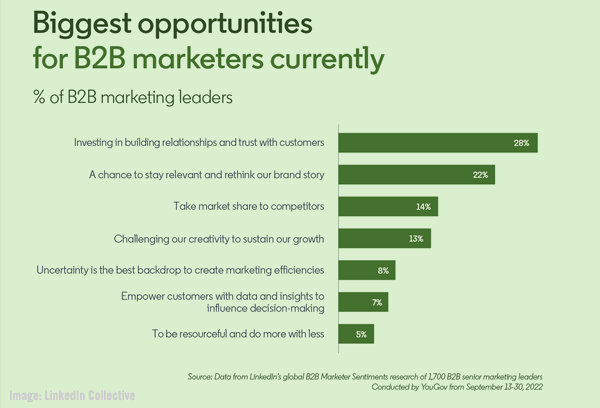 Making an effort to better understand customers and their 2023 obstacles is another way to make the most of economic uncertainty. “Retention rates are softening, conversion rates are lessening, and there seems to be an increase in discount seeking and a more frugal mindset,”
Making an effort to better understand customers and their 2023 obstacles is another way to make the most of economic uncertainty. “Retention rates are softening, conversion rates are lessening, and there seems to be an increase in discount seeking and a more frugal mindset,” 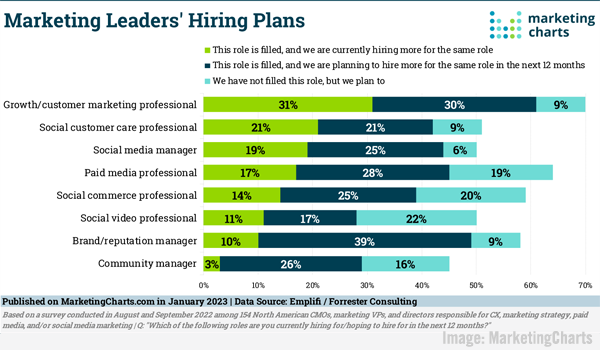 The marketing professionals in these roles are in demand partly due to an increased demand for people who can create personalized digital experiences that humanize B2B brand experiences, and achieve both new customer and subsequent revenue growth. 32 percent of global business decision-makers have said that they are considering increasing marketing and sales activity over the next six months in order to help counteract economic uncertainty, according to recently-published survey
The marketing professionals in these roles are in demand partly due to an increased demand for people who can create personalized digital experiences that humanize B2B brand experiences, and achieve both new customer and subsequent revenue growth. 32 percent of global business decision-makers have said that they are considering increasing marketing and sales activity over the next six months in order to help counteract economic uncertainty, according to recently-published survey 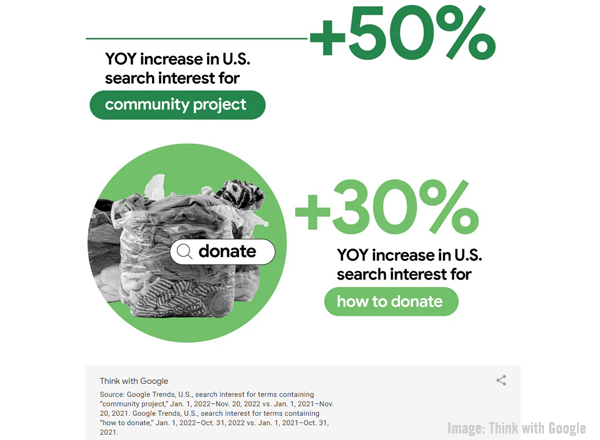 Brand purpose is poised to see growing importance in 2023, with 72 percent of B2B buyers having said that they are more apt to purchase from socially responsible companies, as we covered in our
Brand purpose is poised to see growing importance in 2023, with 72 percent of B2B buyers having said that they are more apt to purchase from socially responsible companies, as we covered in our 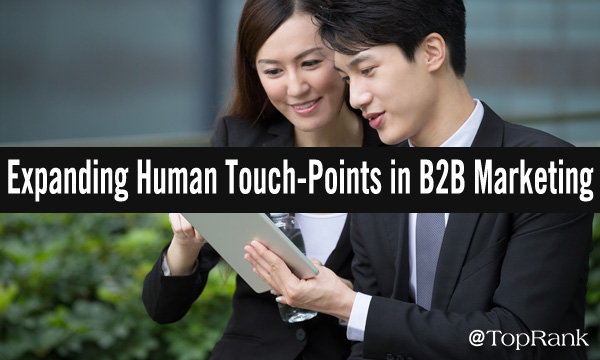
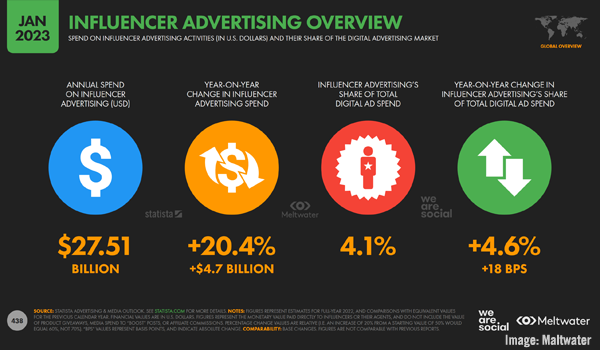 To learn more about the growing power of B2B influence in the face of both economic headwinds and increased use of exclusively AI-created content, check out our
To learn more about the growing power of B2B influence in the face of both economic headwinds and increased use of exclusively AI-created content, check out our 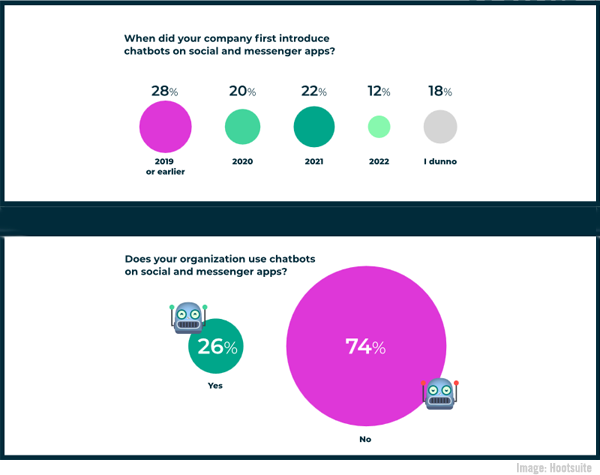 Hootsuite's report points out that businesses focusing on digital customer service hold an advantage over those that don't, however in the B2B sector in particular — with longer buying cycles and generally more touch-points than in the B2C world — brands can also run the risk of relying too heavily on chatbots and other AI technology. Recent data enforces past findings showing that larger organizations are more likely to work with influencers, with Hootsuite's latest report showing that 42 percent of organizations with more than a thousand employees work with influencers, while 35 percent of organizations with between 100 and 999 people utilize influencers, with only 28 percent of businesses with under 100 employees work with influencers.
Hootsuite's report points out that businesses focusing on digital customer service hold an advantage over those that don't, however in the B2B sector in particular — with longer buying cycles and generally more touch-points than in the B2C world — brands can also run the risk of relying too heavily on chatbots and other AI technology. Recent data enforces past findings showing that larger organizations are more likely to work with influencers, with Hootsuite's latest report showing that 42 percent of organizations with more than a thousand employees work with influencers, while 35 percent of organizations with between 100 and 999 people utilize influencers, with only 28 percent of businesses with under 100 employees work with influencers. 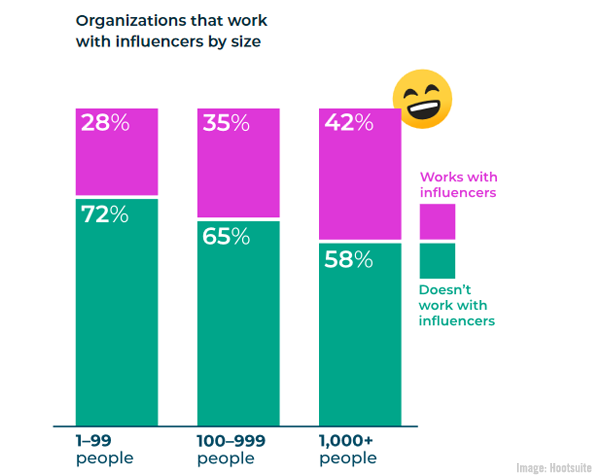
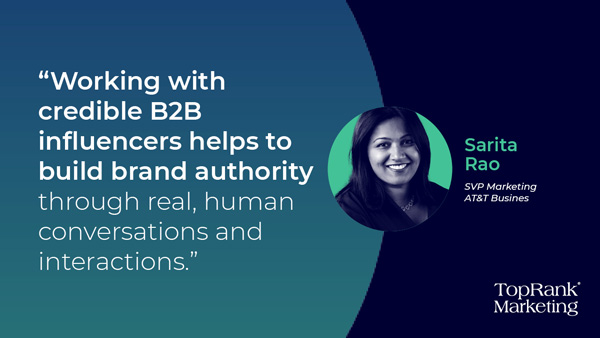 [bctt tweet="“Working with credible B2B influencers helps to build brand authority through real, human conversations and interactions.” — Sarita Rao @saritasayso" username="toprank"] A leading 91 percent of consumers have said that they trust co-workers, family, and friends for brand advice at purchase time, with some 47 percent noting significant trust, while an organization’s own employees were also seen as trusted sources of brand recommendations, along with those from subject matter experts, according to report data we covered in our Friday B2B marketing industry
[bctt tweet="“Working with credible B2B influencers helps to build brand authority through real, human conversations and interactions.” — Sarita Rao @saritasayso" username="toprank"] A leading 91 percent of consumers have said that they trust co-workers, family, and friends for brand advice at purchase time, with some 47 percent noting significant trust, while an organization’s own employees were also seen as trusted sources of brand recommendations, along with those from subject matter experts, according to report data we covered in our Friday B2B marketing industry